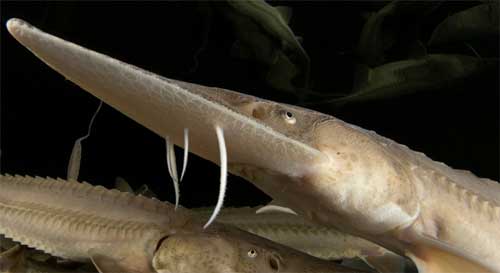In a letter to the journal Science, an interdisciplinary team of more than 220 scientists express concern that the Dakota Access Pipeline (DAPL) could have large negative impacts both on biodiversity and the availability of clean water for the Standing Rock Sioux Tribe and others downstream of the proposed pipeline route.
The DAPL is a proposed 30-inch diameter pipeline spanning approximately 1,150 miles to transport crude oil in the United States. In July 2016, the Standing Rock Sioux Tribe of Fort Yates, North Dakota filed a lawsuit against the United States Army Corps of Engineers over the approved construction of DAPL segments in North Dakota despite assessments ignoring important ecological, cultural, socioeconomic, and public health impacts on the Tribe and region.
The Standing Rock Sioux Tribe is concerned about the construction of DAPL that would pass under the Missouri River (at Lake Oahe), which is located a half mile upstream of the reservation boundary. Indeed, potential spills from the pipeline could impact the drinking water of the Standing Rock Sioux Tribe, as well as thousands of others downstream who rely on the river for drinking water and irrigation.
The team of scientists share the concerns raised by the Standing Rock Sioux Tribe, and argue that construction on the DAPL in North Dakota, should not continue until a more rigorous evaluation of the pipeline’s potential environmental and cultural impacts is conducted.
"Scientists have a duty to share what we discover, especially when our knowledge can help protect the public good," said Katherine Crocker, one of the authors of the letter and member of the Kaw Nation. "In this case, we know that the DAPL is a danger, not only to the health of the Standing Rock Sioux tribal members, but to the millions of other people downstream who rely on the Missouri River and its associated ecosystems for their drinking water, livelihoods, and leisure."
 |
|
Pallid sturgeon. Photo credit: Joel Sartore |
An oil leak along the proposed pipeline route near the Missouri River could have negative impacts on rare freshwater fauna, including the Pallid Sturgeon (Scaphirhynchus albus), which is federally listed as Endangered under the U.S. Endangered Species Act, and Paddlefish (Polyodon spathula), which is currently listed as Vulnerable by the International Union for the Conservation of Nature.
"Oil leaks or spills can have disastrous impacts on water, land and the species and people that depend on them," said Stephanie Januchowski-Hartley, a scientist and one of the authors of the letter. "Cleaning up leaks and spills can also take an incredible amount of resources and time; rarely fully restoring what was lost from a system. Leaks or spills into aquatic environments, like the Missouri River and associated tributaries, can have disastrous consequences beyond the direct sight of the leak or spill."
Wanting to bring the voice of scientists into the process, the team wrote a statement of concern based on issues raised in the lawsuit brought by Standing Rock Sioux Tribe. The statement represents the concerns of a large group of consigning scientists regarding the potential impacts of DAPL construction, or any potential spills, on aquatic or terrestrial species have not been adequately assessed.
The scientists write that DAPL is one of many ongoing approaches to natural resource extraction that overlooks the broader consequences of oil development, noting the potential local and regional impacts from DAPL are symptomatic of the United States’ continued dependence on fossil fuels in the face of broad-scale impacts from global climate change. The authors highlight that continued extractive practices do not comply with commitments made under the 2015 Paris Agreement to cut fossil fuel emissions by 2030.
The authors of the statement, and undersigned scientists, support halting any construction of the DAPL until revised environmental and cultural assessments are carried out as requested by the Standing Rock Sioux Tribe, and in light of recent Paris Agreement commitments, call for the United States Federal Government to give explicit consideration to how this and any other such proposed national energy strategies trade off with public health, environmental justice, and biodiversity conservation.
View the signatories here.
UPDATE: The organizers have sent a letter to United States President Barack Obama. Read the letter.
*Important note: Many of the signatories are members of the Society for Conservation Biology, however, the Society for Conservation Biology does not officially endorse this statement.
Contact
- Stephanie Januchowski-Hartley, PhD, Postdoctoral Researcher, Universite Paul Sabatier, and Society for
Conservation Biology Freshwater Working Group (President)
- Anne Hilborn, PhD Candidate, Virginia Tech
- Katherine Crocker, PhD Candidate, University of Michigan
- Asia Murphy, PhD Candidate, Pennsylvania State University